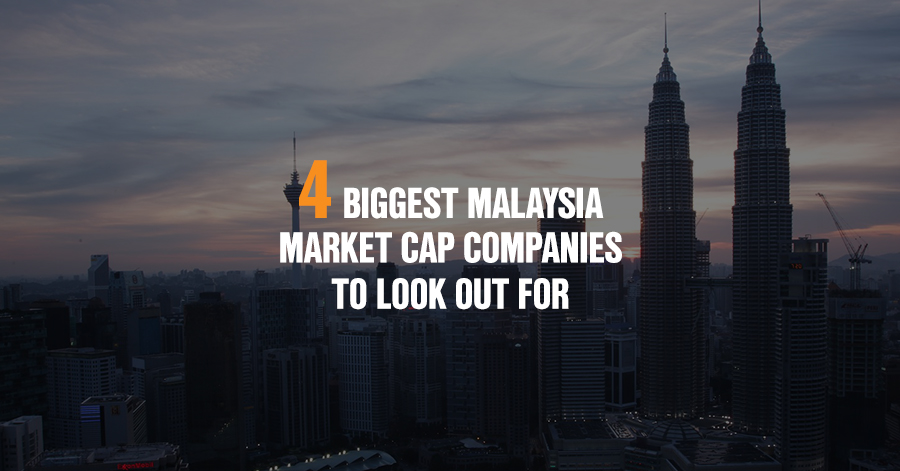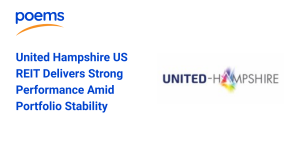4 of the Biggest Malaysia Market Cap Companies Investors Should Watch Out For May 14, 2018

To many who are unaware, Malaysia achieved about 6.5% of GDP growth per annum for the past 50 years.[1] With the 2018 budget announcement, this momentum of growth will continue in 2018 as projected by the World Bank and International Monetary Fund (IMF), with an estimated growth rate ranging from 5.5% to 5.9%.
This sustainable economic growth rate will be backed by domestic demand, resulting from the stable labour market and healthy wage growth. On top of that, Malaysia’s rising strength in global trade and sustained flows of investment into their infrastructure projects in major sectors of the economy will induce economic expansion.
Malaysia’s GDP per Capita increased approximately 4.5% YOY from USD 9,390 (Dec 2016) to USD 9,817 in Dec 2017. World Bank and IMF had classified Malaysia as an emerging economy.
Below are a few large market capitalization companies in Malaysia that may potentially ride along with the economic expansion wave.
Maybank
Since its incorporation in 1960, Maybank now has a network spanning across 10 ASEAN nations in 20 countries. Its key revenue sources come from Malaysia, Singapore and Indonesia.
They are the fourth largest bank in terms of assets within Southeast Asia with almost 50% of their gross loans originating from overseas, which showcases them as more than just a local banking giant. Maybank has three segments of business units; Community Financial Services, Global Banking and Takaful (Insurance). Revenue generation by these business units is approximately 49%, 41% and 7% respectively.
In FY2017, their profit before tax reached an all-time high of RM10.10 billion (up 14.2% YoY) and a net profit of 7.52 billion (up 11.5% YoY). Maybank’s capital ratio of 18.8% as of Feb 2018 is the highest in Malaysia together with a CET1 ratio of 14.19%. [2]
Maybank has one of the highest dividend yield of 5.5% among the big-cap companies. It has a long-term dividend policy of 40%-60% dividend payout ratio. On some years, the payout ratio went even higher to above 70%. It has managed to pay an annual dividend for the past 10 fiscal years which includes the financial crisis period between 2007-2009.
Tenaga Nasional
Tenaga Nasional is the largest public-listed power company in Southeast Asia based on assets. The company has a wide range of businesses, spanning from repairing, testing and maintaining power plants related products. Their main revenue source comes from business in relation to generation, transmission and distribution of electricity.
For the next 3 years, Tenaga Nasional strategy is to focus on their overseas expansion, with the aim of creating an income of RM 20 billion before interest and tax and an expansion of its overseas assets that would account for 20% of earnings before 2025. At the same time, they are growing other businesses units such as maintenance and cable manufacturing.
These will provide an additional source of stable income from domestic demand. The company will continue its momentum of working closely with all government to deliver energy source through solar, wind, large-scale solar (LSS) photovoltaic plant, hydro plant and biogas project. [3]
Axiata Group Berhad
Axiata is one of the leading telecommunications groups in Asia that manages mobile operators in eleven countries. This includes Malaysia, Cambodia, Nepal, India and Singapore. The estimated number of mobile subscribers is growing at a healthy pace, with 350 million subscribers at this moment.
In pursuit of the company’s goal of becoming the New Generation Digital Champion by 2020, Axiata has pieced together the best in the region in terms of innovation, connectivity and talent. In addition, they have created the Axiata Capital Fund, which helps to promote the growth of young and innovative technology companies in the country.
It operates in five countries to deliver telecommunications infrastructure servicesand manages 25,000 towers.
Group revenue for 2017 was at RM24.4 billion (USD5.7 billion) which is an increase of 12.97% as compared to 2016, while market capitalisation stood at over RM49.6 billion (USD12.2 billion) by end 2017. The company contributed more than 25,000 jobs across Asia. [4]
Sime Darby Plantation
Since its incorporation in the early 1900s, Sime Darby Plantation (SD Plantation) has been at the forefront of agriculture research and development in various agro-management practices. These practices have enabled them to achieve the industry’s gold standard in the oil palm and rubber industry.
It owns a total land bank of 343,938 ha and operates 124 oil palm estates together with a combined 11,600 ha of rubber plantation in various countries like Malaysia, Indonesia, Liberia and the Solomon Islands. They have operations in more than 16 countries around the globe to cater to customers’ needs.
Sime Darby’s ceaseless pursuit of scientific and technological development over time has made them the largest Malaysian Sustainable Palm Oil (MSPO) producer to date.
Their oil palm plantation has achieved a yield rate of 5% of total planted hectarage per year. Currently, all of their 34 SOUs (Strategic Operating Units) in Malaysia have received the Roundtable on sustainable palm oil (RSPO) certification.
Group revenue for 2017 was at RM31 billion (USD7.2 billion) which is an increase of 1.7% as compared to 2016, while market capitalisation stood at over RM15 billion (USD3.7 billion) by end 2017. The company contributed more than 120,000 jobs across Asia. [5]
Below are analysts’ consensus target price on the above counters extracted from Bloomberg.
| Name | Market Cap (MYR) | Price: | Best consensus Target Price | Best Dividend Yield | Total Buy call | Total Hold call | Total Sell call | P/E |
|---|---|---|---|---|---|---|---|---|
| Malayan Banking | 116.90B | 10.70 | 11.10 | 5.53 | 13 | 9 | 0 | 14.74 |
| Tenaga Nasional | 91.19B | 16.06 | 17.35 | 3.82 | 16 | 8 | 1 | 12.42 |
| Axiata Group Berhad | 47.87B | 5.29 | 5.64 | 2.36 | 9 | 15 | 2 | 51.86 |
| Sime Darby Plantation | 37.00B | 5.44 | 5.72 | 2.11 | 4 | 12 | 1 | — |
Source: Bloomberg 8 May 2018
MSCI Malaysia Index
You can gain exposure to a broad selection of big-cap Malaysia companies by investing into Exchange-Traded Funds (ETFs) that track Malaysia’s broad-based market index. The MSCI Malaysia index is designed to gauge the performance of the large and mid-cap companies of the Malaysian market. The index has 46 constituents under its holdings and accounts for about 85% of the Malaysian equity market.
You do not have to pick the individual Malaysia company stocks for your portfolio-it allows you to gain instant diversification to more than 46 companies via the ETFs.
Below are two ETFs that replicate the performance of the MSCI Malaysia Index; namely iShares MSCI Malaysia ETF and Xtrackers MSCI Malaysia UCITS.
| ETF | iShares MSCI Malaysia ETF | Xtrackers MSCI Malaysia UCITS ETF | |
|---|---|---|---|
| Ticker | EWM | XCS3 LN / LG6 SP | |
| Inception Date | 12 Mar 1996 | 30 Jun 2010 | |
| AUM | USD 428.4 million | USD 27.34 million | |
| Expense ratio | 0.49% | 0.50% | |
| Number of Holdings | 48 | 48 | |
| Exchange Trade in | AMEX | LSE & SGX | |
| Replication Method | Physical | Physical | |
| Dividend Policy | Distribution | Capitalisation | |
| Benchmark Sector Exposure | Financials – 32.16% Utilities – 12.63% Consumer Staples – 12.39% Industrials – 9.71% Telecommunication Services – 8.35% Consumer Discretionary – 7.38% Materials – 5.39% Health Care – 5.72% Energy – 3.40% Real Estate – 2.22% Information Technology – 0.49% Cash and/or Derivatives – 0.14% | ||
| Top 3 Holdings |
| ||
ETF information is accurate as of 6 August 2018
Conclusion
As the projection indicates that Malaysia should continue a positive outlook for 2018, the Malaysian stock market can be a consideration for investors as part of one’s portfolio diversification strategy. As the saying goes:
“Do Not Put All Your Eggs in One Basket” – Warren Buffett
References
- Malaysia – https://en.wikipedia.org/wiki/Malaysia
- MayBank Newsroom – http://www.maybank.com/en/news-support/newsroom-detailpage.page?detailId=1519815713931010
- Tenaga Nasional – https://www.tnb.com.my/
- Axiata Group – https://www.axiata.com/
- Sime Darby Plantation – http://www.simedarbyplantation.com/
About the author
Mr. Chen JinHui
Equity Dealer
Chen Jinhui deal in the global market equities including Singapore, Malaysia, Thailand, Indonesia, Hong Kong and so on. He has 1.5 years dealing experience and he currently supports traders, dealers and fund managers on dealing activities. He graduated with Bachelor of Science in Finance from Singapore Institute of Management.

 Grab Holdings Achieves First Full Year of Net Profit with Strong Revenue Growth
Grab Holdings Achieves First Full Year of Net Profit with Strong Revenue Growth  Lendlease Global Commercial REIT Strengthens Retail Portfolio with PLQ Mall Acquisition
Lendlease Global Commercial REIT Strengthens Retail Portfolio with PLQ Mall Acquisition  United Hampshire US REIT Delivers Strong Performance Amid Portfolio Stability
United Hampshire US REIT Delivers Strong Performance Amid Portfolio Stability  CDL Hospitality Trusts: Lease-Based Cash Flows Support Improving Leverage Profile
CDL Hospitality Trusts: Lease-Based Cash Flows Support Improving Leverage Profile 





